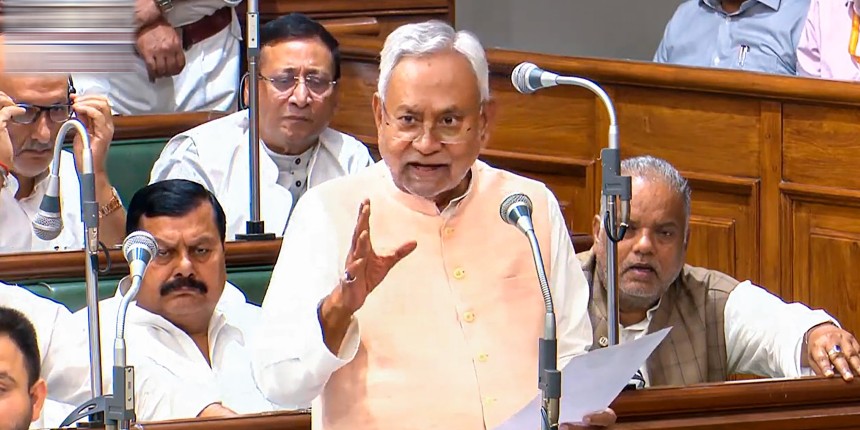Nitish Kumar Comment: Women’s education and fertility rate strongly correlated, show studies
Atul Krishna | November 8, 2023 | 04:29 PM IST | 3 mins read
Bihar CM Nitish Kumar was pointing to the state’s fertility rate which has dropped to 2.9% and its literacy rate which has risen to 79.7%.

NEW DELHI: Bihar chief minister Nitish Kumar’s remark on the importance of education in population control, during a speech in the Legislative Assembly on Tuesday, ran into controversy. The minister made remarks and used gestures widely believed to be lewd and distasteful while pointing out the reduction in fertility rate in Bihar and had to later apologise. However, studies have shown a strong correlation between women’s education and fertility rates.
In Bihar’s case the state’s fertility rate dropped from 4.3% in 2011-12 to 2.9% in 2023. Over the same time period, its literacy rate rose from 61.8% to 79.7%, according to the latest Bihar Caste Survey.
According to the Sample Registration System Statistical (SRSS) Report 2020, there is a significant correlation between women’s education levels and fertility rate. The Total Fertility Rate (TFR) for illiterate women is far higher at 3.1 compared to women who are graduates or above (1.6). This is true for both rural and urban settings.
The World Health Organisation defines TFR as the average number of children a woman would have at the end of their reproductive period. The TFR required to replace the population is 2.0.
Fertility Rate: Urban and rural
India’s SRSS is one of the largest demographic surveys in the world covering about 8.4 million sample population. It is carried out by the Office of Registrar General and Census Commissioner, India with an objective of providing annual estimates of birth rate, death rate, infant mortality rate and various other fertility and mortality indicators.
According to the report, in rural areas, the total fertility rate for illiterate women is 3.3 while for women who are graduates and above it is at 1.7. In urban areas, the TFR for illiterate women is at 2.5 while for women who are graduates and above it is at 1.5.
Total fertility Rate by women’s education level
Education level of women | Urban | Rural | Total |
Illiterate | 2.5 | 3.3 | 3.1 |
Total literate | 1.6 | 2.1 | 1.9 |
Without any formal education | 2 | 2.6 | 2.4 |
Below primary | 1.8 | 2.7 | 2.5 |
Primary | 1.7 | 2.4 | 2.3 |
Middle | 1.7 | 2.1 | 2 |
Class 10 | 1.7 | 2 | 1.9 |
Class 12 | 1.5 | 1.8 | 1.7 |
Graduate and above | 1.5 | 1.7 | 1.6 |
The effect of education on fertility rate is evident even when comparing illiterate women with women who are literate but without formal education. According to the report, while the TFR for illiterate women is at 3.1, the TFR for literate women without formal education falls to 2.4.
Also Read| Higher education can help reduce child marriage by 80%; preventing practice still a distant dream
The correlation between women’s education and fertility rates is widely documented. A study conducted in 1986 ahead of the Union Government’s Seventh Plan, titled Importance of Female Primary Education for Fertility Reduction in India, found that “there is convincing evidence that female education in India monotonically increases the use of contraception and age at marriage, both of which, in turn, decrease fertility”. The authors argued that educational policy should be given “high priority” for fertility reduction.
Nitish Kumar speech and gestures
However, the controversy around Nitish Kumar’s remarks were largely around his gestures and phrases which the opposition BJP leaders called “vulgar”.
Deputy CM Tejashwi Yadav tried to defend the chief minister by saying that the remark was about sex education. "Let me clarify something... whatever the Chief Minister said was about sex education. People become hesitant over this topic... but it is taught in schools. He said what needs to be done practically..," Yadav said.
AIMIM chief Asaduddin Owaisi also criticised the comment. "He could have said, 'if women are educated enough (they will) be able to decide when to have children'. Instead, he described it through inappropriate words and gestures," he told reporters.
Nitish Kumar had to apologise for his remarks. "I apologise and I take back my words. If my words were wrong, I apologise. If anyone got hurt, I take them back. (My words) were not intended to hurt anybody. I have always maintained education is necessary for population control. I have also stood for women empowerment and women's development," said Nitish Kumar to ANI.
Follow us for the latest education news on colleges and universities, admission, courses, exams, research, education policies, study abroad and more..
To get in touch, write to us at news@careers360.com.
Next Story
]‘Wholesale assault on scientific temper’: Science networks launch national campaign
Launched on the birth anniversaries of CV Raman and Marie Curie, the campaign aims to counter the ‘wholesale assault on scientific temper, critical thinking, evidence-based reasoning’ propagated by those in power.
Atul Krishna